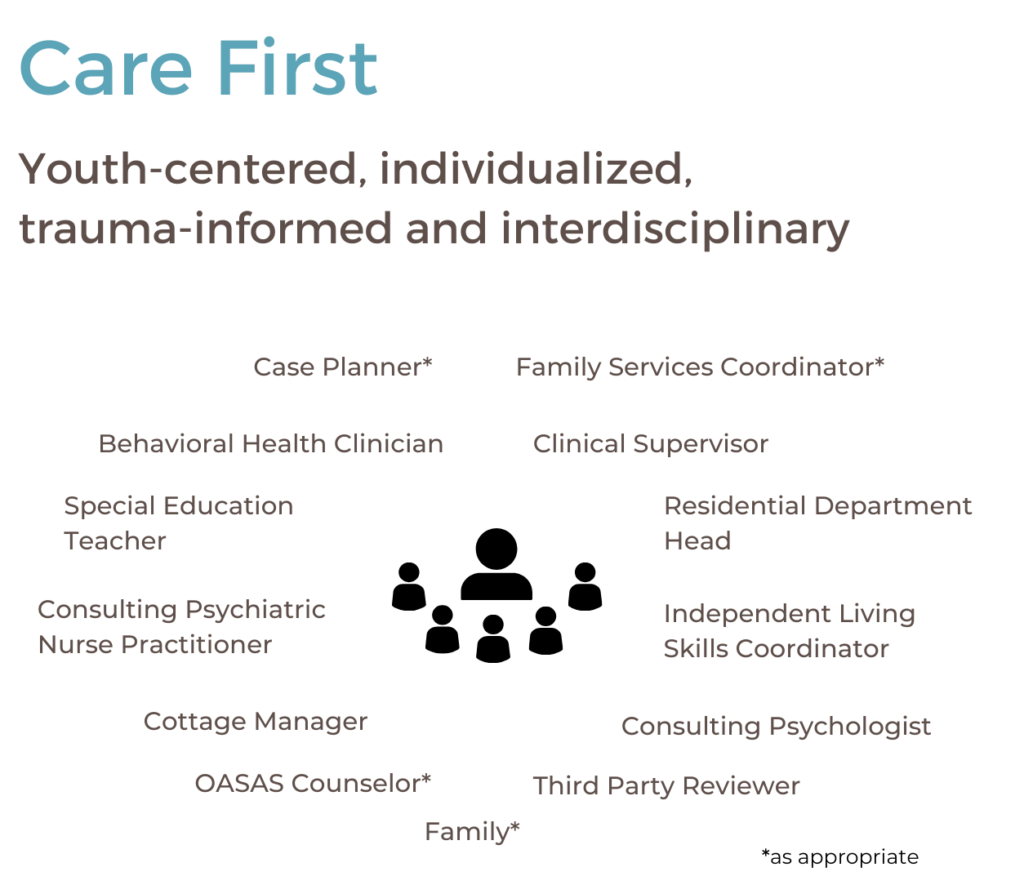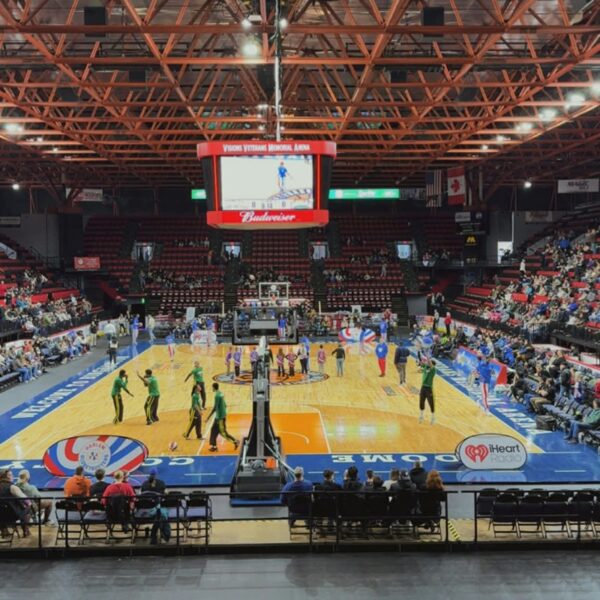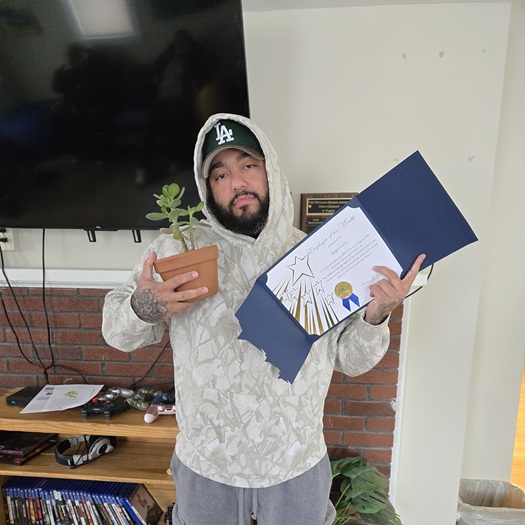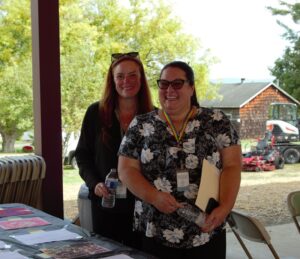WGA’s residential programs are for New York’s high-risk, high-need youth who have historically been underserved.
By the time a child has been referred for residential treatment services, they have demonstrated an inability to function safely and consistently within social norms in a less restrictive setting, such as at home or in school. They have histories of chronic involvement in the juvenile justice, mental health and/or foster care system. Community-based supports and interventions have been overall unsuccessful.
At The William George Agency, a child’s past does not define their future. Instead it offers insight that helps guide the milieu therapy that occurs 24/7 for a child participating in one of our residential programs.
Structured activities and a comprehensive Life Skills curriculum readies them for reunification with family, community living and/or independent functioning.
While at WGA, youth reside in homes with a dining room, kitchen, laundry area and community space for recreational activities. Depending on the program, most youth have their own bedroom.

Each youth is treated with dignity and care upon arrival and is expected to behave the same towards themselves and others. Teaching how to respect oneself and others is a fundamental value. Our commitment to youth and their families and/or support network is to remain honest, direct and respectful in our interactions.
Staffing structure is designed to provide residents a high degree of physical and emotional safety in their home and around campus, allowing for the best possible treatment outcomes. A highly enhanced staffing pattern nurtures real-life opportunities for youth to form healing relationships with self and child care staff. Consistency in treatment and reality-based relationships help youth develop pro-social behavior and better adaptive coping mechanisms.
Staff are trained in evidence-based, trauma-informed therapeutic crisis intervention, motivational interviewing and an array of other techniques that facilitate a youth’s growth and achievement of personal goals.
Youth work directly with members of their own interdisciplinary treatment team of knowledgeable professionals to help develop their goals and support their best self. Goals are mutually agreed upon after a comprehensive health analysis. Progress in achieving goals is regularly celebrated through campus-wide recognition ceremonies and special activities.

WGA Regional Care Managers provide 6 months of after care services to assist youth and families in a youth’s transition back to their community. Family outreach begins at the onset of a youth’s stay to begin the process of repairing broken family bonds or to help strengthen healthy family connections. Family reunification is always the goal when in the youth’s best interest.
Our strength-based model focuses on the potential and strengths of each youth rather than their deficits or problems. We incorporate best practices and a trauma informed model of care to meet the multi-dimensional needs of youth in our care. This approach equips youth with the tools needed to become self-confident, independent, and hopeful in regard to their future success and personal fulfillment.
A Living-Learning Environment

Planting Seeds for a Brighter Future
Young people are shaped by the experiences and relationships around them, especially during their formative years. They learn by observing the adults and peers in

Employee of the Month January 2026
Congratulations Angel Ortiz. Mr. Ortiz was nominated as employee of the month by James Gilmore for helping to guide youth participating in Alcoholics Anonymous and

Restoring Trust, Empowering Families
No man is an island. This principle is especially true at The William George Agency for Children’s Services (WGA), where adolescent youth receive intensive, out-of-home
About Our Programs
While WGA’s mission is to provide a safe and caring residential environment for at-risk youth, we are unable to accept youth who do not have sufficient contact with reality (e.g., youth who are actively psychotic). To make a referral or speak with someone about our programs, please contact a member of our Admissions Team.
The Strive Program
Serves up to 70 boys to provide comprehensive treatment to adolescent males (aged 12 – 21) with an IQ above 70 and who experience significant mental health needs and severe behavioral and emotional dysregulation
For youth who have not succeeded in or been deemed appropriate for either community-based services or regular institutional care.
The Empowerment Program
Serves up to 18 girls to provide comprehensive treatment to adolescent females (ages 12 – 21) with an IQ above 70 and present with history of trauma and a mental health disorder including diagnosis related to a disturbance of conduct.
For youth who have not succeeded in or been deemed appropriate for either community-based services or regular institutional care.
The Pathways to Independence Program
Serves up to 22 youth to meet the needs of boys (aged 12- 21) with an IQ between 55 and 70 and are experiencing behavioral and/or emotional problems which require out-of-home treatment services.
The Skills for Success Program
Serves up to 11 boys to meet the needs of boys (aged 12- 21) with an IQ between 60 and 75 and are experiencing behavioral and/or emotional problems requiring out-of-home treatment services.
Youth Centered Recovery Program
Serves up to 9 boys and 9 girls to treat adolescent males and females (ages 12 – 21) who have failed in outpatient and inpatient chemical dependency treatment programs for alcohol and/or substance dependence and a co-occurring mental health disorder. Must have a full IQ scale above 70. May be court mandated or have a willingness to engage in treatment.
The RTA Program (Rethink, Transform & Achieve)
Serves up to 16 boys to serve youth (aged 16 – 21) with an IQ above 70, with significant mental health needs and with severe behavioral and emotional dysregulation. For youth who have committed non-violent felonies that New York State’s Raise the Age legislation allows for referral to family court.
The Healing Pathways Program
Serves up to 20 boys to meet the treatment needs of boys (ages 12 – 21) with an IQ above 70 and have been adjudicated a juvenile delinquent for sex offenses or who have a history of perpetration and acknowledge their need for treatment. This program is not for youth who have a history of chronic criminal violence.
Intermediate Care for Boys
Serves up to 18 boys to meet the needs of boys who have resided at WGA for at least 90 days under the Strive or Healing Pathways Programs level of care and have demonstrated sufficient progress in treatment where they can manage symptoms in a somewhat less structured setting.
For youth who can benefit from additional services around social skill development and emotional regulation to successfully negotiate the peer environment.